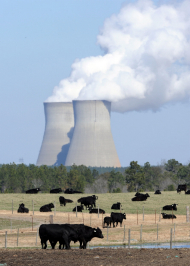Utility Executives Like Nuclear Power. Climate
Science, Not So Much.
By TODD WOODY

ImageEPA Nuclear energy is the utility industry’s preferred
“environmentally friendly” technology, followed by wind power and
natural gas, a new survey found.
American utility industry executives see nuclear energy as the most
promising carbon-free power source, are skeptical of climate change
science, and are uncertain about the future, according to a report to be
issued Thursday by Black & Veatch, the engineering and consulting giant.
The survey of 329 executives, managers and engineers, which Black &
Veatch shared with The New York Times, comes as the utility industry
faces slow growth in energy consumption and a two-year fall in capital
spending, the first such decline since the Great Depression.
“The industry is facing a lot of demands to spend more money to fix up
an aging infrastructure, build smart grids and deal with cybersecurity
while cutting carbon emissions,” said Bill Kemp, a Black & Veatch vice
president, in an interview. “In the near term, we’ll have a difficult
economic environment and a slow sales growth as regulators are reluctant
to push through large rate increases while voters are still in pain.”
The stalled emissions trading legislation in Congress has added to the
confusion about the future shape of the electricity market, Black &
Veatch found. Despite a prominent campaign by some utility executives to
support an emissions trading market, more than 70 percent of the
industry insiders surveyed oppose the current legislation and 52 percent
said the United States cannot afford the proposal to cap greenhouse gas
emissions.
More than 75 percent think there is a future for coal-fired power
plants.
In fact, 44 percent of those surveyed don’t believe global warming is
caused by human activity, according to the report, while 7 percent don’t
believe the planet is warming.
“Utility respondents generally appear to be less certain of the threat
of global warming than the general public and scientific community, as
well as many political and policy leaders,” the report’s authors wrote.
“Utility professionals also seem to be quite disturbed about the
direction of the global warming movement,” they added, “and the
likelihood that their organizations will be facing what many of them
seem to view as draconian changes in the short term.”
Nuclear energy is the utility industry’s preferred “environmentally
friendly” technology, followed by wind power and natural gas, the survey
found.
Greenhouse gas emissions are the industry’s No. 1 environmental concern,
followed by worries about the sufficiency of water supplies to cool
power plants. Mr. Kemp said water concerns had become a growing issue
since Black & Veatch began conducting the survey in 2006.
“There’s increasing water scarcity in lots of areas of the country,
including the West, Texas and parts of the Southeast,” he said.
It’s a problem elsewhere as well. Mr. Kemp said that a 5,000-megawatt
coal-fired power plant complex that Black & Veatch is helping build in
South Africa will be air-cooled because of a local water shortage.